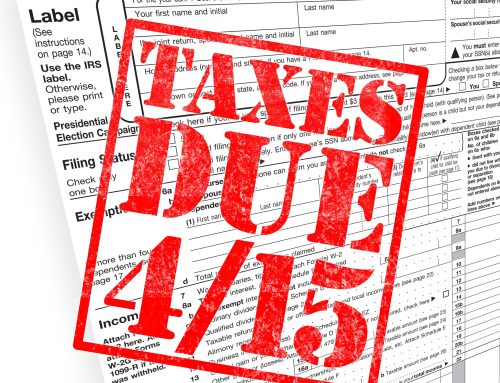Article Highlights:
- Failure to File
- Failure to Pay
- Borrowing from Family
- Home-Equity Loans
- Credit Cards
- Installment Agreements
- Pension Plans
If you are unable to pay your tax liability for 2016, here is some information that you need to know. Most importantly, you should not let your inability to pay your tax liability in full keep you from filing your tax return properly and on time. This is because you must still pay the “failure to file” penalty, which accrues at a rate of 5% per month or partial month (up to a maximum of 25%) on the amount of tax that you owe based on your return. You can delay the “failure to file” penalty for six months by filing an extension, but that won’t keep you penalty-free.
Although an extension provides you with more time to file your actual return, it is not an extension of your payment date. If you do not pay the balance of your 2016 tax liability, you will be subject to the “failure to pay” penalty. This penalty accrues at the rate of 0.5% per month or partial month (up to a maximum of 25%) on the amount that you owe based on your return.
If both penalties apply, the “failure to file” penalty drops to 4.5% per month or part thereof, so the total combined penalty remains 5%. The maximum combined penalty for the first five months is thus 25%. Thereafter, the “failure to pay” penalty will continue to increase at 1/2% per month for 45 more months (up to an additional 22.5%). Thus, the combined penalties can reach a total of 47.5% over time. Both of these penalties are in addition to the interest charges on the late payments.
The bottom line is that, if you owe money, it is best to file your return on time even if you can’t pay the entire liability. That will minimize your penalties. Paying as much as you can with your return will further minimizing your penalties. By the way, neither the penalties nor the interest are tax-deductible.
Possible Solutions – The following are possible ways to pay your tax liability when you don’t have the funds readily available:
- Relatives and Friends – Borrowing money from family members or close friends is often the simplest method to pay a tax bill. One advantage of such loans is that the interest rate will probably be low; however, you must also consider that loans of more than $10,000 at below-market interest rates may trigger tax consequences. Any interest paid on this type of loan would be nondeductible. This may not be the best idea as this means you’ll be acquiring more loans which results in further debt, although if you do opt for this and the worst case scenario happens then you could consider Debt Consolidation Loans. These types of loans help you pay off multiple existing loans, and then you only have to pay off this existing loan in instalments. But this is certainly something to look into before dedicating to it, that’s if you want to loan money from friends and family, that is.
- Home-Equity Loans – A home-equity loan is another potential source of funds; such a loan has the advantage that the interest is deductible as long as the total equity loans on the home don’t exceed $100,000. However, in today’s financial environment, qualifying for these loans may be too time-consuming.
- Credit or Debit Cards – Using your credit card to pay your taxes is another option. The IRS has approved three firms to provide this service. The disadvantages are that the interest rates are relatively high and that you must pay the merchant fee (because the IRS does not). For information about this fee and about making payments by credit card, visit the IRS website.
- Installment Agreements – You can request an installment arrangement with the IRS. You must be up-to-date when filing your returns. There are also fees associated with setting up an installment agreement, and if you do not follow some strict payment rules, the agreement can be terminated. If your liability is under $50,000 and you can pay off the full liability within 6 years, you will not be required to submit financial statements, and you can apply online. In this age of technology you might want to ask, why do people apply for online payday loans, nearly every answer will tell you that is it due to its accessibility. When applying online, you’ll get an immediate acceptance or rejection of your payment plan. These installment agreements are similar to the installment loans you’d get from a site like https://www.towerloan.com/lending/installment-loans/, so it may be worth having a look over there to see if you can get an even better deal.
The fee for establishing such an agreement can be as high as $225, but it can be as low as $31 if you set up an online payment agreement and pay using direct debit from your bank account. You will also be charged interest, but the late-payment penalty will be half of the usual rate (1/4% instead of 1/2%) if you file your return by the due date (including extensions).
If any of the following occur, the installment agreement may terminate, causing all of your taxes to become due immediately: the information you provided to the IRS in applying for the agreement proves inaccurate or incomplete; you miss an installment; you fail to pay another tax liability when it is due; the IRS believes that its collection of the tax involved is in jeopardy; or you fail to provide an update regarding your financial condition when the IRS makes a reasonable request for you to do so.
- Pension Plans – Tapping into one’s pension plan or IRA should be a very last resort, not only because it degrades your future retirement but also because of the potential tax implications. Generally, except for Roth IRAs, the funds in retirement accounts are pretax; as a result, when withdrawn, they become taxable. If you are under 59½, any such distribution will also be subject to the 10% early-withdrawal penalty. Federal tax, state tax (if applicable), and this penalty can chew up a hefty amount of the distribution, which may be too high a price to pay.
A Final Word of Caution – Ignoring your filing obligation only makes matters worse, and doing so can become very expensive. It can lead to the IRS collection process, which can include attachments, liens or even the seizure and sale of your property. In many cases, these tax nightmares can be avoided by taking advantage of the solutions discussed above. If you cannot pay your taxes, please call this office to discuss your options.







